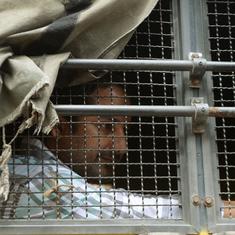Their room was cool and dark; being away from the sun felt so good. Outdoors and in the little room behind the big house, it was never this pleasant. There, the sun beat down on you and the racket made by the donkey carts passing by always disturbed your sleep. Bano lay on the soft carpet, playing with Maagul’s hands while she admired her new glass bangles.
“See these ones, Bano?” Maagul said. “Look, look at them shine!”
Bano noticed the light reflecting off the bangles change as she shook Maagul’s hand, held in her own.
“Can I have that one?”
Maagul slid two of the green bangles off her wrist. The radio tinkled out the song from a new film.
“Come, let’s dance,” said Maagul, rising and pulling Bano up. “Come.”
The two held hands and started to run around in circles. “Shall we ask Chan to join in?” “Yes!” They ran out, shouting her name.
Most days were spent like that. The only time the girls separated was when they had to study, go to school or have their meals. Amma said they needed a great many lessons and training so that they would grow up to be proper women. All the begums were put through such training. Every one of them knew how to read books written in English, put on make-up and carry off beautiful clothes.
Bano supposed she didn’t need such lessons, but she still went to school and ate with her family what was, almost always, the same kind of food – all the leftovers that Amma brought home from the big house every night.
At home, Amma would slap the wet swab cloth on the floor, wiping it vigorously, her face glistening with droplets of sweat. The hand pump behind the big house provided them with most of the water they needed. Sometimes, Bano washed herself in the fountain with the girls (that’s what she missed the most – splashing around in the fountain with the other girls). But that practice had been discontinued. They were older now and had to bathe in their rooms.
The first day she entered the Durrani House, Bano was barely a few days old, tied to her mother’s back as she swept the floors. Sweat had rolled down her mother’s back, moistening Bano’s little belly.
Now that she was a teenager, she and the bibis had stopped playing with each other; everything had suddenly become more serious, even sombre. Bano found herself serving the Durrani girls, instead. Fat-faced Maagul was the worst of the lot. When she was angry, the skin on her face, stretched taut across her bones, never creased. It got redder and redder, instead.
“This, this and this,” Maagul now said, flinging her clothes at Bano, who stooped to pick them off the floor and gather them up in her arms. “I want all of them starched and dazzling white by tomorrow. Go!”
Bano hurried to the bathroom, picked up the bar of homemade soap and walked out through the front door. Around the corner was home. She entered its small, clean courtyard and went to the water pipe in the corner. She wet the clothes and squatted down on her haunches. Water ran down her hand and dripped to the ground.
“Watch what you’re doing!” Amma yelled. “Why do you always waste so much water? The clothes from the big house have to be washed in water from their taps. How many times have I told you this!”
With that, Amma whacked Bano hard on the head, upsetting her balance and causing her to hit her forehead against the brass tap.
“I’m just doing this for Maagul Bibi,” the girl protested. “I tell you, the sooner she gets married, the better. At least, we won’t have to look at her fat face. She’s changed so much in a few years. All she does is shout all day: ‘Do this! Do that!’ I feel as though I’m a donkey. I’m not a human any more.”
“You,” Amma retorted, “you are to blame for no one asking for your hand in marriage till now. That mouth of yours! Always gaping open. Always jabbering. Why don’t you just lock some of your thoughts inside, you stupid girl! No one in our qabila wants you.”
“I’m only fifteen.”
“So? I was hardly that age when I was married off. And anyway, I’m trying to spare you the ordeal of working there all your life.” Amma gestured towards the roof of the big house. “They want you to accompany Maagul Bibi after she is married.”
“Where?”
“To her marital home. That’s their custom. One servant always accompanies the bride.”
“Really?”
“It will be a good opportunity for you. Imagine living in University Town. Nice modern house. You’ll see, you will get to learn so much. They will look after you. I know they will. These Khans, once they accept responsibility for someone, it is for life. You understand?”
“I understand more than you think I do, Amma. I’m not going anywhere. I’m not, I’m not, I’m not!”
“You think it is easy looking after a growing girl, while I am busy in the big house all day? With all the men ready to jump on you? The safest thing is to let the Khans look after you and then get you married.”
“When will I be back?”
“You won’t be back. Rashid Khan will make sure your needs are taken care of, but you’ll accompany Maagul Bibi whenever she comes over to visit her parents and siblings.”
“And how often will that be?”
“I can’t say, but once Rashid Khan finds you a nice boy and marries you off to him, you can visit us whenever you like. I don’t want to hear talk about my daughter failing to carry on the work of her forefathers. We have always eaten the salt of the Durranis, your grandmother, her mother and I. We’re indebted to them. You understand?”
Bano didn’t understand. Instead, she cried herself to sleep for four consecutive nights after that. She knew she couldn’t fight her kismet.
Bano straightened her numb legs. Jaani, one of the cooks, cautiously stepped over the piling mound of shit and nudged her to lead the way out. Tucked away to the left of the house were the communal toilets where the women went to relieve themselves, sometimes together. They consisted of a long marble plank – marble worth more money than the little shack some families lived in – set up higher than ground level, with holes along it at regular intervals over which the women would squat, often four times a day, and gossip about the day’s events. Bano found comfort in the darkness of that room, because the little light that stole in wasn’t enough for you to make out the shape of its occupants’ bottoms. The only opening was high up near the ceiling and let out just a bit of the stench.
Every morning and evening, Lal came in to collect the shit, a straw broom in his hand, his leather water bag balanced on his shoulder like a drenched dog. He inspected the room before sweeping the shit towards the drains.

Excerpted with permission from The Begums of Peshawar, Najma Yusufi, Hachette India.










